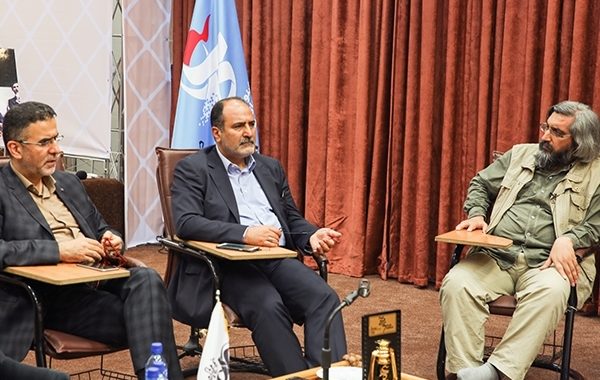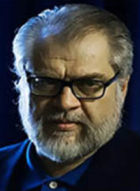TEHRAN (AIPFF) - Head of Iran's Cinema Organization (ICO) Hojjatollah Ayoubi visited APFF's secretariat on Sunday to learn about the festival's ongoing activities and innovations, and meet with its organizers.
TEHRAN (AIPFF) – Head of Iran’s Cinema Organization (ICO) Hojjatollah Ayoubi visited APFF’s secretariat on Sunday to learn about the festival’s ongoing activities and innovations, and meet with its organizers.
Accompanied by Habib Il Beigi, the organization’s deputy of supervision and evaluation, Ayoubi met Vahid Jalili, head of APFF’s policy-making council and a member of its secretariat. During the meeting, Ayoubi indicated optimism for APFF and the genres considered by the festival, saying that ICO monitors and follows up on APFF activities and productions in a bid to promote its filmmakers.
“Ammar Festival is a major development in the Iranian cinema so far as it links the world’s latest developments in the world with traditional social foundations and institutions like mosques and seminaries,” Ayoubi said. “As long as these two are not intermingled, nothing big will happen in cultural and artistic grounds and linking these two would be a major service to the society.”

He farther hailed APFF for creating a bond between modern promotional means and traditional centers through the language of films and the media. “In effect, Ammar Festival complements the cinema, and ICO and APFF have no frictions in their goals and I have said it many times that we endorse APFF and the popular screening of its films.”
Regarding introducing and supporting APFF filmmakers and artists, the senior cinema official said that ICO would eagerly support an integrated mechanism for introduction of APFF figures as long as APFF promotes the cinema of the Islamic Revolution and screens such films in religious and traditional locations like mosques which is an honorable development.
The ICO chief further said that APFF’s popular screening of films must be taken seriously and cultural stuff must be reached by the general public.
“In this year’s edition of APFF, we are planning to provide mobile screens with the title of “Cinema Salam”, so that films and cinematic works will be displayed in remote border regions of the country which are safe enough for presentation of such items but have been void of access to cultural works,” he said, adding that ICO is prepared to offer such means to APFF’s popular screenings to help them be presented in more professional manner.
The Audiovisual Media Institute, which has recently been equipped with a video-on-demand (VOD) system, can offer special services to promotion and distribution of APFF products with financial support from ICO, Ayoubi added.
He honored APFF for attracting religious classes of the society to the cinema, adding, “We would favor an APFF that professionally displays its works and ICO would support the festival to provide a permanent location for displaying its films near mosques and other populous centers.”
Elsewhere in his remarks, the official said ICO is ready to support APFF’s international section. “The international section of Fajr Film Festival claims to be the custodian of eastern and Islamic cinema and it is supposed to be a safe haven for cinematic works that are close to Iranian cinema. This is the reason that the festival’s domestic and international sections are being held separately. Before the separation, the international section of the festival was only a showcase.”

He expressed hope for linking the international sections of APFF and Fajr Film Festival. “At Fajr Festival, we have been seeking to attract filmmakers from countries like Lebanon, Iraq, etc. who happen to be producing some good stuff whose likes are never found anywhere else in the world but have no place in mainstream festivals.”
“APFF’s popular nature does not prevent it from certain formalities and joint meetings can be held for sharing ideas, creating synergy between organizers of different festivals and even addressing financial shortcomings.”
At the end of his remarks, he expressed hope that APFF will be successful in its mission. He also called for formation of a committee between ICO and APFF for more cooperation. “APFF may open its arms to the society’s cinematic works because I am certain that many Iranian cineastes feel committed to cooperation with APFF and despite the fact that you many think these people may not meet APFF’s standards, I know many of them are keen on working with APFF and ICO is ready to broke APFF’s linkage with them.”

For his part, Vahid Jalili said Iran’s cinema is indebted to the Islamic Revolution and it is now its duty to repay its debt to the revolution.
Head of the policy-making council of Ammar Popular Film Festival (APFF) says the festival is not seeking sham and hypocrisy in its behavior and it is for this reason that it openly voices its identity and direction. “One of the most serious problems with the cinema in Iran is that identities have transformed,” said Vahid Jalili.
“The Islamic Revolution discourse has prompted filmmakers who clung to unsuitable means for attracting the audience prior to the revolution, to resort to real forms of art to be successful in their works,” said Jalili, referring to one of his recent interviews.
He said, “There are calls on the religious strata of the society to iron out their relations with the country’s cinematic society, but it is the latter that must do the same with the Islamic Revolution as the greatest popular event in the contemporary history.”
Jalili, who is also the chief editor of Rah Cultural, Analytic Magazine, further said APFF has always opened arms to cineastes. “We began out honoring traditions by lauding late Amir Ghavidel as a veteran director, and later honored Davoud Mir Bagheri, Bahzad Behzadpour and late Farajollah Salahshour as popular and international artists in the Revolution’s cinema. Besides, many of Iran’s most professional and renowned cinematic figures are in APFF’s crew acting as APFF’s judges and advisors, like Nader Talibzadeh, Abolghasem Talebi, Houshang Tavakoli and Mohammad Hossein Niromand.”
Ever since its foundation, APFF has tried to shun Hippocratic behavior and has displayed its identity clearly and openly and has stuck to that belief, added Jalili.
He said one of the biggest problems in Iran’s cinema is that identities are changing and maybe the other side may need some advice in this regard.
“Both sides need to sync their views about each other and be more optimistic,” he said. “We believe that there is a range of views and tastes in Iran’s cinema which are all respected in the Islamic Republic, and APFF is a piece of Iranian cinema which is seeking to tap people’s potentialities and spur them into action.”
Jalili stressed the role of ICO in international section of Fajr Film Festival, saying that there was a time that Soviet and Russian film-maker Andrei Tarkovsky was regarded as creating the prevalent current in global media. “If the same efforts were made to introduce anti-imperialist, anti-US and Islamic currents in the world, something good would have happened. It seems that commonalities of the Revolution cinematic works with such works are a lot and are being displayed by the international section of Fajr Festival and APFF will need ICO’s support for operate stronger in the field.”
APFF seeks to link the Iranian cinema with that of the Revolution which would require involving the general public with the festival as a first step, he added.

The cultural figure said people are willing to pay for their desired cultural items. As an example, he said, in a village called Mo’ez Abad in southern city of Shiraz, people closed ranks to pay for construction of a theater in their village, and something similar happened in Afin village in the eastern province of Khorasan Jonoubi.
He further said APFF has so far received over 85,000 short messages from the people, adding that the festival would have need a large work crew if it was to carry out its activities by relying on state resources. This is while volunteers from among the people help in screening of APFF films in their cities by charging people money in many instances.



